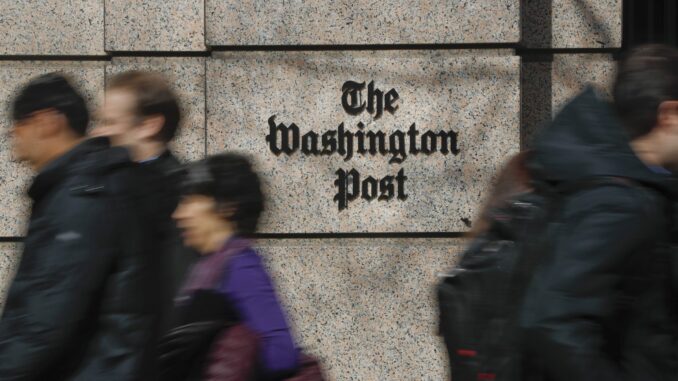
NEW YORK —The Washington Post was in turmoil on Monday following the abrupt departure of its executive editor and a hastily announced restructuring plan to stem an exodus of readers.
Post publisher Will Lewis and Matt Murray, a former Wall Street Journal editor named to temporarily replace Sally Buzbee, met with reporters and editors at the Post on Monday to explain changes outlined in a Sunday email.
The plan includes splitting the newsroom into three divisions with managers who report to Lewis — one that encompasses the Post’s core news reporting, one with opinion pieces and the third devoted to attracting new consumers through social media, video, artificial intelligence and sales.
“It kind of blindsided people,” said Paul Farhi, a recently retired media reporter at the Post. “But it shows you that Will Lewis is working out of a sense of crisis and urgency. He’s only been there five months and making gigantic changes to the newsroom.”
Like most news organizations, the Post has lost readers—a decline more acute because the Washington-based outlet boomed with interest in politics during the Trump administration. The Post’s website had 101 million unique visitors a month in 2020, dropping to 50 million at the end of 2023. The Post lost a reported $77 million last year.
“Although (Post owner) Jeff Bezos is very rich, it has been my observation that billionaires don’t like to lose money,” said Margaret Sullivan, a former Post columnist and now the executive director for the Craig Newmark Center for Journalism Ethics and Security at the Columbia Journalism School.
The new division designed to attract new customers — the Post called it a “third newsroom” — is steeped in mystery. While the Post once headquartered the people running its digital products in a separate building, for several years, it has integrated that and social media into the regular newsroom, as have many organizations.” Maybe it’s brilliant and innovative,” Sullivan said. “But it just strikes me as being odd.”
“It feels so retro — reminiscent of search engine optimization, social media and pivoting to video, just as AI and agents threaten to become a new web,” said Jeff Jarvis, author of “The Gutenberg Parenthesis: The Age of Print and its Lessons for the Age of the Internet.”
Murray will be in charge of this division following the election. The newspaper said that after that, Robert Winnett, a longtime editor at the Telegraph in England, will take over the core reporting functions at the Post.
Post staff members expressed some concern about three men — all of them new to a newspaper that takes some pride in journalists working their way up through the ranks and two of them British-born — being in charge at a crucial time.
“In a few months, two British-born editors will be running the leading newspaper in the capital of the United States,” Farhi said. “It was kind of unimaginable a couple of months ago.”
They won’t be alone. Other U.S.-based news organizations with British-born leaders included The Wall Street Journal, with editor-in-chief Emma Tucker; CNN, with chairman and CEO Mark Thompson; and The Associated Press, with Daisy Veerasingham as president and CEO.
Lewis was also questioned about his commitment to diversity after the first woman to be the editor in charge of the Post left. According to a person at the meeting, he said he was committed to it, “and you’ll see it going forward.”
Lewis has talked about finding ways to reach millions of Americans who want to stay informed but don’t feel that traditional news products serve their needs.
Farhi said efforts to make organizations like the Post and the Times more attractive to subscribers may contribute to the trends hurting local news. As the newspapers seek out more national and international customers, he said, they are much less likely to invest in covering local news.



